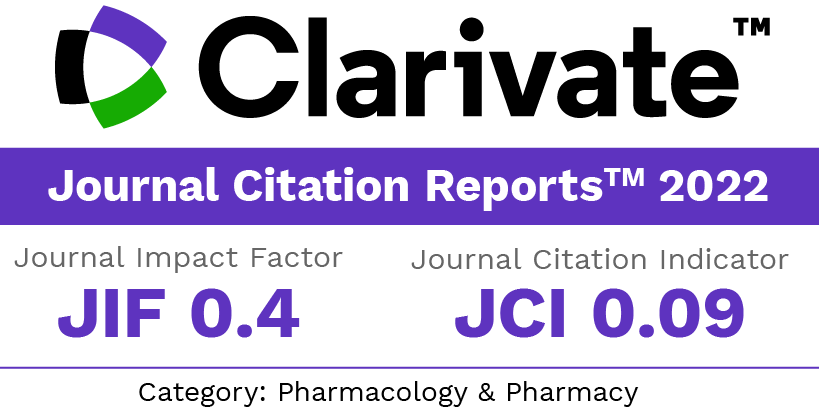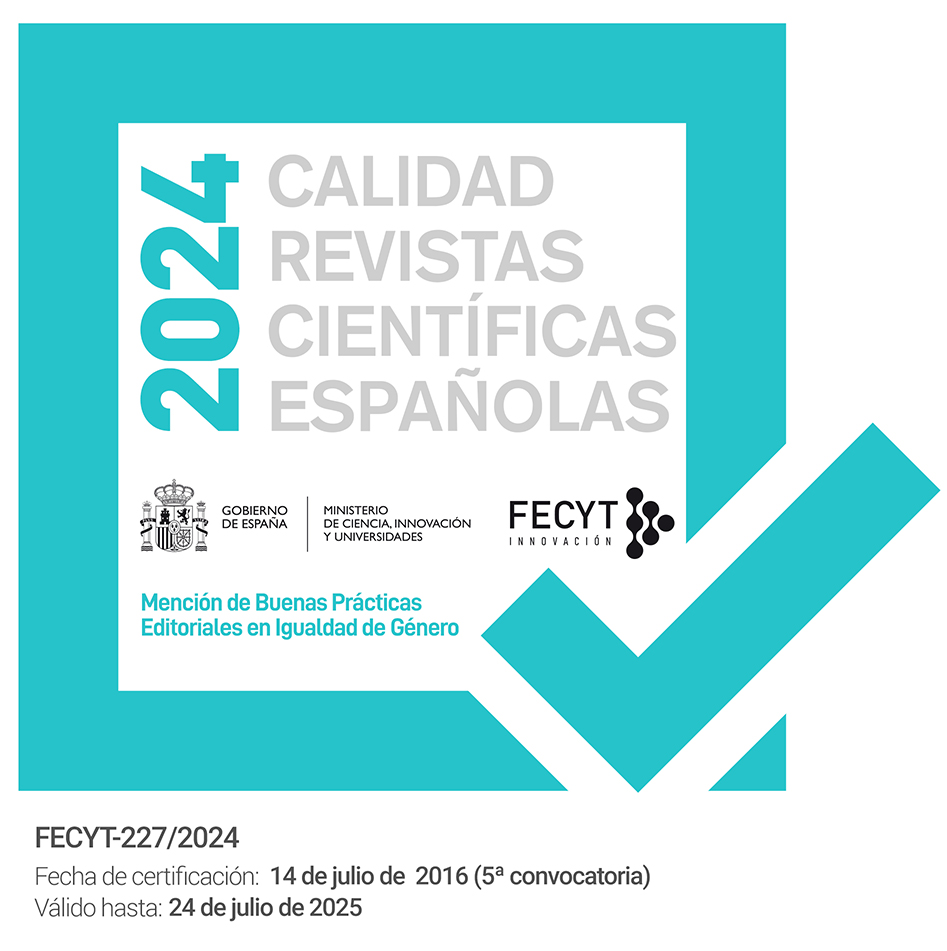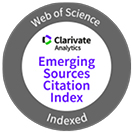Consequences derived from self-medication with benzodiazepines in adults: scoping review
DOI:
https://doi.org/10.30827/ars.v62i4.21614Keywords:
Self Medication; Benzodiazepines; Substance-Related Disorders; Prescription Drug Monitoring Programs; Prescription DrugsAbstract
Introduction: To review the scientific evidence on the consequences of self-medication with benzodiazepines (BZD) in adults.
Method: Exploratory review of the articles retrieved from the bibliographic databases MEDLINE (PubMed), Embase, Cochrane Library, Scopus and Web of Science until October 2020. The search query was formulated using the descriptors “Self Medication” and “Benzodiazepines”, also using the related Entry Terms and filters: «Humans» and «Adult: 19+years». The quality of the articles was evaluated using the STROBE questionnaire.
Results: From the 388 references retrieved, after applying the inclusion and exclusion criteria, 14 articles were selected. Once the articles were evaluated by means of the STROBE questionnaire for this review the scores ranged from a minimum of 8.7 to a maximum of 17.7, with median equal to 14.3. Self-medication was studied in 8 articles; overuse was researched in 2 of them; 2 other articles’ aim was to examine self-medication or overuse with the purpose of treating emotions, stress or, directly, using them as drug. Other observed outcomes were overdosage, in addition to their previous and subsequent consumption to joining the methadone program.
Conclusions: The revised articles have documented a high prevalence of self-medication and self-manipulation of BZD. It is essential to know the use pattern of each population branch in order to establish measures which guarantee both suitable prescription and rational use. By improving pharmaceutical care in the process of dispensing BZD (warning of the effects of chronic treatment and the exclusivity of prescriptions) and pharmaceutical validation (detection of unsuitable prescriptions) BZD self-medication and its derived consequences could be actively prevented.
Downloads
References
Domínguez V, Collares M, Ormaechea G, Tamosiunas G. Uso racional de benzodiacepinas: hacia una mejor prescripción. Rev Urug Med Interna. 2016;1(3):14-24.
Busto UE. Factores de riesgo en el abuso y la dependencia a benzodiacepinas. Trastor Adict. 2000;2(3):177-82.
Guina J, Merrill B. Benzodiazepines I: Upping the Care on Downers: The Evidence of Risks, Benefits and Alternatives. J Clin Med. 2018;7(2):e17. DOI: 10.3390/jcm7020017
Prasad SB. Self Medication and their consequences: A challenge to health professional. Asian J Pharm Clin Res. 2016;9(2):314-7.
Airagnes G, Pelissolo A, Lavallée M, Flament M, Limosin F. Benzodiazepine Misuse in the Elderly: Risk Factors, Consequences, and Management. Curr Psychiatry Rep. 2016;18(10):89. DOI: 10.1007/s11920-016-0727-9
The United Nations Office on Drugs and Crime (UNODC). World Drug Report 2019. Vienna, Austria: United Nations; 2019.
Comisión Interamericana para el Control del Abuso de Drogas (CICAD), Organización de los Estados Americanos (OEA). Informe sobre el Consumo de Drogas en las Américas 2019. Washington DC, USA: CICAD, OEA; 2019.
Rodríguez Sánchez V. Una adicción invisible: Práctica de prescripción y representaciones sociales del consumo de benzodiazepinas desde el enfoque de género [tesis doctoral]. Elche, España: Universidad Miguel Hernández; 2017.
Agencia Española de Medicamentos y Productos Sanitarios. Utilización de medicamentos ansiolíticos e hipnóticos en España durante el periodo 2000-2012 [Internet]. Madrid, España: Ministerio de Sanidad, Servicios Sociales e Igualdad; 2014 [citado 14 de diciembre de 2020]. Disponible en: https://bit.ly/3aaFIQ8
Moher D, Liberati A, Tetzlaff J, Altman DG, PRISMA Group. Preferred reporting items for systematic reviews and meta-analyses: the PRISMA statement. PLoS Med. 2009;6(7):e1000097. DOI: 10.1371/journal.pmed.1000097
Wanden-Berghe C, Sanz-Valero J. Systematic reviews in nutrition: standardized methodology. Br J Nutr. 2012;107(Suppl 2):S3-S7. DOI: 10.1017/S0007114512001432
von Elm E, Altman DG, Egger M, Pocock SJ, Gøtzsche PC, Vandenbroucke JP, et al. The Strengthening the Reporting of Observational Studies in Epidemiology (STROBE) statement: guidelines for reporting observational studies. Gac Sanit. 2008;22(2):144-50. DOI: 10.1157/13119325
Berkman ND, Lohr KN, Ansari M, McDonagh M, Balk E, Whitlock E, et al. Grading the Strength of a Body of Evidence When Assessing Health Care Interventions for the Effective Health Care Program of the Agency for Healthcare Research and Quality: An Update. En: Agency for Healthcare Research and Quality (AHRQ), editor. Methods Guide for Effectiveness and Comparative Effectiveness Reviews [Internet]. Rockville, USA: AHRQ; 2008 [citado 14 de diciembre de 2020]. Disponible en: https://www.ncbi.nlm.nih.gov/books/NBK47095/
Murphy KD, Lambert S, McCarthy S, Sahm LJ, Byrne S. «You Don’t Feel»: The Experience of Youth Benzodiazepine Misuse in Ireland. J Psychoactive Drugs. 2018;50(2):121-8. DOI: 10.1080/02791072.2017.1371365
Rubio González V, Redondo Martín S, Ruíz López Del Prado G, Muñoz Moreno MF, Velázquez Miranda A. Hospital Emergencies Associated with the Consumption of Hypnotics and Sedatives, 2009-2013, Castilla y León, Spain. Rev Esp Salud Publica. 2016;90:e1-12.
Caro-Mantilla M, Apolinaire-Pennini J, González-Menéndez R. Uso inadecuado de psicofármacos en las personas de 60 años y más. Revista Finlay [revista en Internet]. 2013 [citado 14 de diciembre de 2020]; 3(1):[aprox. 9 p.]. Disponible en: http://revfinlay.sld.cu/index.php/finlay/article/view/174.
Chen KW, Berger CC, Forde DP, D’Adamo C, Weintraub E, Gandhi D. Benzodiazepine use and misuse among patients in a methadone program. BMC Psychiatry. 2011;11:90. DOI: 10.1186/1471-244X-11-90
Khan SA, Farooq S, Bano A. Pattern of Benzodiazepine use in Nurses. Gomal J Med Sci. 2011;9(1):28-31.
Klemenc-Ketis Z, Hladnik Z, Kersnik J. A cross sectional study of sex differences in self-medication practices among university students in Slovenia. Coll Antropol. 2011;35(2):329-34.
Marín GH, Cañas M, Carlson S, Silvestrini MP, Corva S, Mestorino N, et al. Self-Medication, Substance Abuse and Alcohol Consumption in Students Attending to La Plata National University, Argentina. Lat Am J Pharm. 2010;29(8):1425-30.
Divac N, Jasović M, Djukić L, Vujnović M, Babić D, Bajcetić M, et al. Benzodiazepines utilization and self-medication as correlates of stress in the population of Serbia. Pharmacoepidemiol Drug Saf. 2004;13(5):315-22. DOI: 10.1002/pds.940
Silva Herrera S, Vergara Fabián E, Yera Alós I, Freijoso E. Utilización de benzodiazepinas en la Atención Primaria de Salud. Rev Cubana Med Gen Integr. 2002;18(3):1-5.
Segura Noguera JM, Barreiro Montaña MC, Bastida Bastús N, Collado Gastalver D, González Solanellas M, Linares Juan de Sentmenat C, et al. Home chronic illness and consumption of psychopharmaceuticals. Aten Primaria. 2000;26(9):620-3. DOI: 10.1016/s0212-6567(00)78734-8
Gelkopf M, Bleich A, Hayward R, Bodner G, Adelson M. Characteristics of benzodiazepine abuse in methadone maintenance treatment patients: a 1 year prospective study in an Israeli clinic. Drug Alcohol Depend. 1999;55(1-2):63-8. DOI: 10.1016/s0376-8716(98)00175-6
Kouyanou K, Pither CE, Wessely S. Medication misuse, abuse and dependence in chronic pain patients. J Psychosom Res. 1997;43(5):497-504. DOI: 10.1016/s0022-3999(97)00171-2
Ochs HR, Miller LG, Greenblatt DJ, Shader RI. Actual versus reported benzodiazepine usage by medical outpatients. Eur J Clin Pharmacol. 1987;32(4):383-8. DOI: 10.1007/BF00543974
Ladewig D. Abuse of benzodiazepines in western European society--incidence and prevalence, motives, drug acquisition. Pharmacopsychiatria. 1983;16(4):103-6. Doi: 10.1055/s-2007-1017458
Bernabeu-Martínez MA, Sanz Valero J. Análisis bibliométrico y temático de la producción científica existente en la base de datos bibliográfica MEDLINE sobre medicamentos peligrosos en las Unidades de Hospitalización a Domicilio. Hosp Domic. 2018;2(3):101-15. DOI: 10.22585/hospdomic.v2i3.50
Sanz-Valero J, Tomás-Gorriz V, Morales-Suárez-Varela M. Estudio bibliométrico de la producción científica publicada por la revista Ars Pharmaceutica en el periodo 2001 a 2013. Ars Pharm. 2014;55(2):1-10.
Urios López R, Sanz-Valero J. Efectos adversos asociados al uso de anabolizantes en deportistas: revisión sistemática. Ars Pharm. 2018;59(1):45-55.
Gómez S, León T, Macuer M, Alves M, Ruiz S. Benzodiazepine use in elderly population in Latin America. Rev Med Chil. 2017;145(3):351-9. DOI: 10.4067/S0034-98872017000300009
Sánchez-Moya J, Sanz-Valero J, Lopez-Pintor E. Intervenciones desde la farmacia comunitaria en los pacientes adultos que reciben atención de la salud a domicilio: revisión exploratoria. Hosp Domic. 2020;4(4):209-27. DOI: 10.22585/hospdomic.v4i4.113
Troncoso-Piñeiro P, González de Giarratana AE, Rivadulla-Lema I, Torres-Romero MG, Sanz-Valero J. Neoplasias en trabajadores expuestos al aluminio y/o sus compuestos: Revisión sistemática. Med Segur Trab. 2018;64(252):312-26.
Pedersen W, Lavik NJ. Adolescents and benzodiazepines: prescribed use, self-medication and intoxication. Acta Psychiatr Scand. 1991;84(1):94-8. DOI: 10.1111/j.1600-0447.1991.tb01427.x
Boyd CJ, Austic E, Epstein-Ngo Q, Veliz PT, McCabe SE. A prospective study of adolescents’ nonmedical use of anxiolytic and sleep medication. Psychol Addict Behav. 2015;29(1):184-91. DOI: 10.1037/adb0000026
Observatorio Español de las Drogas y las Adicciones (OEDA). Informe 2020: Alcohol, tabaco y drogas ilegales en España [Internet]. Madrid, España: Ministerio de Sanidad; 2020 [citado 8 de enero de 2021]. Disponible en: https://bit.ly/2L4Gi84
Klanzler HR, Ciraulo DA, Zindel LR. Clinical Manual of Addiction Psychopharmacology. Washington DC, USA: American Psychiatric Publishing; 2014.
Maletzky BM, Klotter J. Addiction to diazepam. Int J Addict. 1976;11(1):95-115. DOI: 10.3109/10826087109045533
Opaleye ES, Noto AR, Sanchez ZM, Amato TC, Locatelli DP, Gossop M, et al. Nonprescribed use of tranquilizers or sedatives by adolescents: a Brazilian national survey. BMC Public Health. 2013;13:499. DOI: 10.1186/1471-2458-13-499
Weaver MF. Prescription Sedative Misuse and Abuse. Yale J Biol Med. 2015;88(3):247-56.
Agarwal SD, Landon BE. Patterns in Outpatient Benzodiazepine Prescribing in the United States. JAMA Netw Open. 2019;2(1):e187399. DOI: 10.1001/jamanetworkopen.2018.7399
Mathieu C, Joly P, Jacqmin-Gadda H, Wanneveich M, Bégaud B, Pariente A. Patterns of Benzodiazepine Use and Excess Risk of All-Cause Mortality in the Elderly: A Nationwide Cohort Study. Drug Saf. 2021;44(1):53-62. DOI: 10.1007/s40264-020-00992-7.
Baandrup L, Ebdrup BH, Rasmussen JØ, Lindschou J, Gluud C, Glenthøj BY. Pharmacological interventions for benzodiazepine discontinuation in chronic benzodiazepine users. Cochrane Database Syst Rev. 2018;3(3):CD011481. DOI: 10.1002/14651858.CD011481.pub2
Gea Cabrera A, Sanz-Lorente M, Sanz-Valero J, López-Pintor E. Compliance and Adherence to Enteral Nutrition Treatment in Adults: A Systematic Review. Nutrients. 2019;11(11):e2627. DOI: 10.3390/nu11112627
Downloads
Published
How to Cite
Issue
Section
License
The articles, which are published in this journal, are subject to the following terms in relation to the rights of patrimonial or exploitation:
- The authors will keep their copyright and guarantee to the journal the right of first publication of their work, which will be distributed with a Creative Commons BY-NC-SA 4.0 license that allows third parties to reuse the work whenever its author, quote the original source and do not make commercial use of it.
b. The authors may adopt other non-exclusive licensing agreements for the distribution of the published version of the work (e.g., deposit it in an institutional telematic file or publish it in a monographic volume) provided that the original source of its publication is indicated.
c. Authors are allowed and advised to disseminate their work through the Internet (e.g. in institutional repositories or on their website) before and during the submission process, which can produce interesting exchanges and increase citations of the published work. (See The effect of open access).























